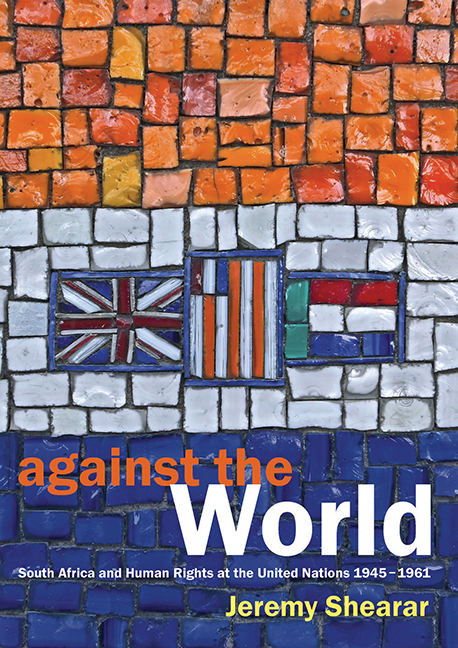Book contents
- Frontmatter
- Contents
- Acknowledgements
- Abbreviations
- Introduction: ‘What we have lost is all the more reason for cherishing what survives’
- 1 Quod severis metes: Birth of the United Nations
- Chapter 2 South African Indians
- 3 Universal Declaration of Human Rights
- 4 International covenants on human rights
- 5 United Nations surveys of human rights issues
- 6 Evolution of human rights at the United Nations
- 7 State sovereignty at issue
- 8 Apartheid on the agenda
- 9 Shadow of Sharpeville
- 10 General relations with the United Nations
- 11 Concluding observations
- Appendix: Selected provisions of the United Nations Charter
- Sources and references
- Index
1 - Quod severis metes: Birth of the United Nations
Published online by Cambridge University Press: 19 March 2020
- Frontmatter
- Contents
- Acknowledgements
- Abbreviations
- Introduction: ‘What we have lost is all the more reason for cherishing what survives’
- 1 Quod severis metes: Birth of the United Nations
- Chapter 2 South African Indians
- 3 Universal Declaration of Human Rights
- 4 International covenants on human rights
- 5 United Nations surveys of human rights issues
- 6 Evolution of human rights at the United Nations
- 7 State sovereignty at issue
- 8 Apartheid on the agenda
- 9 Shadow of Sharpeville
- 10 General relations with the United Nations
- 11 Concluding observations
- Appendix: Selected provisions of the United Nations Charter
- Sources and references
- Index
Summary
International organisation for a post-war world
From the outbreak of the Second World War, it was abundantly clear that the Covenant of the League of Nations (League) would not be adequate to meet the needs of a postwar world. Although the League continued to function nominally, most Allied combatants opposed its resuscitation and agreed that new arrangements were essential to maintain global peace and security. This entailed the continuing cooperation of the Great Powers, specifically the United Kingdom (UK), the United States of America (US) and the Union of Soviet Socialist Republics (USSR or Soviet Union), of which the second never joined and the third had been expelled from the League. The South African (SA) Prime Minister during the war years, Field Marshal Jan Smuts, was kept fully briefed on and frequently consulted about practical negotiations for a new organisation by the UK Prime Minister, Winston Churchill. Smuts's participation in the final discussions to create the new body was taken for granted and he would be elected to a high profile if rather honorific post at the United Nations Conference on International Organization (UNCIO).
The first public mention of a new arrangement was in the seventh clause of the Atlantic Charter, negotiated and signed on 12 August 1941 by US President Franklin D. Roosevelt and Churchill, which referred to the ‘establishment of a wider and more permanent system of general security’ than the League had provided. The Atlantic Charter itself could be said to hark back to two seminal documents. The first, containing the notion of a general association of nations ‘affording mutual guarantees of political independence and territorial integrity to great and small states alike’, was the last of US President Woodrow Wilson's Fourteen Points speech to the US Congress on 8 January 1918. In it he affirmed the principle of adjusting colonial claims on the basis of sovereignty, equal weight being given to ‘the interests of the populations concerned’. The second, which implicitly raised the question of fundamental human rights, was a speech distinguishing the Four Freedoms delivered 23 years later in the same forum by Roosevelt. The rights Roosevelt emphasised were those SA would maintain to be the fundamental rights implied in the Charter. They were freedom of speech and expression, freedom of religion or the ‘right to worship God in his own way’, freedom from want and freedom from fear.
- Type
- Chapter
- Information
- Against the WorldSouth Africa and Human Rights at the United Nations 1945–1961, pp. 7 - 23Publisher: University of South AfricaPrint publication year: 2017



